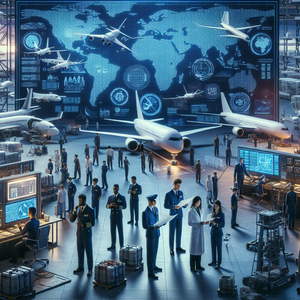
Top 20 Aviation Careers Thriving in 2025: Navigating Tariff Challenges and Opportunities
The aviation industry, a cornerstone of global connectivity and commerce, is navigating a transformative period in 2025. U.S. tariffs on materials and goods critical to aircraft manufacturing and operations have reshaped the industry landscape, creating challenges and opportunities in equal measure. Designed to bolster domestic production, these tariffs have driven up costs, disrupted supply chains, and forced businesses to rethink their strategies. However, this disruption has also spurred innovation and opened new avenues for growth, particularly in key job roles.
Job Summaries:
Aerospace Manufacturing Engineer:
- Aerospace Manufacturing Engineers are integral to adapting production processes in response to tariff-driven cost increases.
- They develop innovative workflows, identify alternative materials, and ensure compliance with trade regulations.
- As tariffs inflate the price of imported components, these engineers are pivotal in reducing reliance on international suppliers while protecting efficiency.
- Key skills include a Bachelor’s degree in engineering, proficiency in CAD software, and advanced problem-solving abilities.
Supply Chain Analyst:
- Supply Chain Analysts optimize logistics.
- Evaluate supplier contracts.
- Devise alternative sourcing strategies to mitigate rising costs.
- Maintain operational continuity in a volatile market.
- Key skills include a degree in supply chain management or business.
- Expertise in data analysis tools.
- A strategic mindset.
MRO (Maintenance, Repair, Overhaul) Technician:
- MRO Technicians are critical for keeping fleets operational due to the high cost of new aircraft and parts caused by tariffs.
- They perform inspections, repairs, and maintenance to extend the lifespan of existing aircraft.
- Key skills include FAA certification, hands-on mechanical skills, and knowledge of aviation compliance standards.
Aviation Compliance Officer:
- Aviation Compliance Officers navigate the complex regulatory landscape created by new trade policies.
- They conduct audits, ensure adherence to trade and safety regulations, and help businesses avoid costly penalties.
- Key skills include a background in law, business, or aviation compliance, with CRCM certification recommended.
Aircraft Systems Analyst:
- Aircraft Systems Analysts use data-driven insights to enhance efficiency and profitability.
- They identify savings opportunities through performance optimization and predictive diagnostics.
- Key skills include a degree in aerospace engineering or computer science, and expertise in data modeling.
Sustainability Specialist in Aviation:
- Sustainability Specialists develop strategies to reduce emissions, improve fuel efficiency, and adopt renewable or domestic materials.
- They address environmental concerns and tariff challenges.
- Key skills include a background in environmental science or engineering, familiarity with aviation operations, and an innovative mindset.
Aerospace Procurement Specialist:
- Procurement Specialists negotiate contracts.
- Analyze markets.
- Source cost-effective materials to ensure affordability across the supply chain.
- Vital in managing costs in a tariff-heavy environment.
- Key skills include a degree in supply chain management or business administration.
- Negotiation expertise.
Aircraft Certification Engineer:
- Certification Engineers ensure that aircraft components meet strict safety and regulatory standards.
- They play a crucial role in maintaining compliance as new materials are introduced to navigate tariff challenges.
- Key skills include a degree in aerospace engineering and knowledge of FAA and EASA regulations.
Air Cargo Logistics Manager:
- Logistics Managers optimize routes.
- Negotiate freight rates.
- Manage warehouse operations to keep goods moving efficiently despite tariff-induced challenges.
- Key skills include a degree in logistics or business.
- Experience in air cargo operations.
Aerospace Economist:
- Aerospace Economists analyze the financial impacts of tariffs and advise stakeholders on market strategies.
- Their insights help businesses adapt to shifting economic conditions.
- Key skills include a degree in economics with aviation expertise.
The aviation industry of 2025 is a testament to resilience and innovation. While tariffs have introduced complex challenges, they have also created opportunities for growth in roles that drive efficiency, sustainability, and compliance. Whether you're an engineer optimizing production processes, a supply chain analyst rethinking logistics, or a sustainability specialist driving eco-friendly solutions, this is your moment to shine. By preparing for the challenges ahead, you'll not only secure your place in the industry but also contribute to its enduring success.
Explore More Jobs

